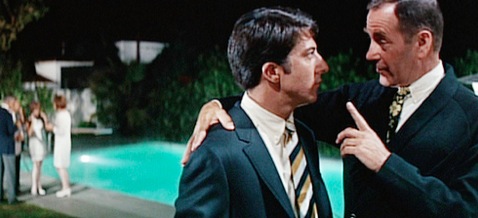
For many years the mainstream media has verbally eviscerated hipsters as if they’re some kind of Ebola virus. Hipsters are vilified, accused of destroying the social and moral fabric of America with their off-the-grid lifestyle and perceived sloth, to being the Fifth Column in the gentrification and displacement of working class folk through collaboration with Gordon Gekko inspired real-estate developers. Unless you’re a wealthy, celeb hipster, you’re a target.
Many of America’s movie stars portray hipsters, including Dustin Hoffman as the 21 year old, silver-spooned Benjamin Braddock in The Graduate (1967) and Sam Elliot as the 32-year-old bohemian lifeguard Rick Carlson in Lifeguard (1976). Both characters rejected corporate offers; one in plastics, the other as a Porsche salesman.
The irony of the anti-hipster campaign is that the movie audience loved and rooted for post WW II “rebels”, beginning in the 1950s with James Dean who eschewed societal expectations. But even in the so-called more liberal 21st century, if Bob or Joe pursue the same lifestyle as our bygone celebs he’s considered a bum, or worse.
Hipsters never impose their lifestyle or values on anyone and welcome anyone to join but they won’t be put out if they don’t. They are bold urban pioneers occupying nabes that were lost, forgotten, abandoned, left to rot and fester. The same media who crowned the hipsters as saviors by resurrecting down-and-out neighborhoods of yesterday, blame them as the cause of these same neighborhoods becoming Millionaire Row today.
The two-faced media demonizes hipsters, yet lauds those middle-aged corporate executives who parachuted (or were thrown under the bus) who now pursue a simpler lifestyle to run a non-profit creative firm, become teachers, run an organic farm or help inner-city kids read. Ironically hipsters are doing the same thing and are doing what most people always wanted to do from the get-go.

Youth is not a prerequisite for being a hipster, rather, it’s a mindset. Those so-called older folks trapped in the corporate Twilight Zone pine for the chance to lead such a lifestyle, although no one wants to call it that. Financial firms tout investment products to their clients so these clients can pursue the very same activities in retirement as hipsters are engaged in today.
The prolonged economic depression has reduced or eliminated hipsters’ employment choices. Even if hipsters found a corporate job, there are only short-term prospects with killer work hours, zero security, no pension, and worthless stock options.
It’s almost as if today’s college-educated youth can’t do anything right. If they pursue an MBA or JD they’re accused of becoming greedy materialists. If they pursue work in a community arts center they are labeled unambitious and a drain on society.
Hipsters represent the genuine bulwark against repressive corporate conformity and governmental mandates, and are the vanguard of creative growth and an eternal youthful spirit. So don your bohemian fashion and change the world.
—Albert Goldson is an Architectural & Engineering Contract Manager specializing in transportation megaprojects, energy, and urban planning. He is a long-term Williamsburg resident, an internationalist, and avid jazz aficionado.
Leave a Reply